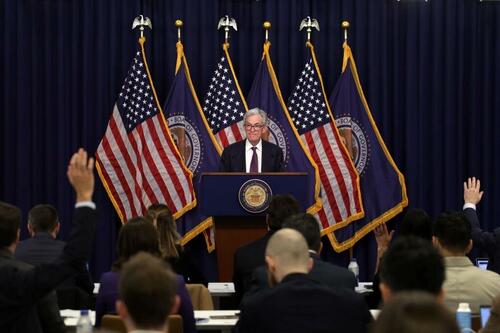Authored by Naveen Athrappully via The Epoch Times,
The U.S. Federal Reserve is exiting a global climate change coalition days before the new Trump administration is set to take power on Jan. 20.
The Federal Reserve had joined the Network of Central Banks and Supervisors for Greening the Financial System (NGFS) in December 2020. NGFS, composed of global central banks and supervisors, aims to integrate climate and environmental risk management into the financial sector and mobilize “finance to support the transition toward a sustainable economy,” according to the group’s website. On Friday, the Federal Reserve announced its withdrawal from the 143-member coalition.
“The work of the NGFS has increasingly broadened in scope, covering a wider range of issues that are outside of the Board’s statutory mandate,” the agency said. Five Federal Reserve officials, including chair Jerome Powell, voted for the withdrawal, while two officials did not vote.
Rep. Andy Barr (R-Ky.) welcomed the Federal Reserve decision, calling it a “step in the right direction,” according to a Jan. 18 post on social media platform X.
“By pulling out from the NGFS, the Fed sets itself up to reprioritize the needs of American citizens and the U.S. financial system “instead of the wants of unelected, foreign bureaucrats,” he said.
Ben Cushing, campaign director for the Sierra Club’s Fossil-Free Finance campaign, blamed the upcoming Trump administration for the Fed’s recent decision to exit NGFS, according to a Jan. 17 statement.
“The incoming administration’s efforts to deny and exacerbate the climate crisis should be a reason for the Fed to assert its independence by addressing climate risks, but instead it’s doing the opposite,” Cushing said.
“If the Fed continues to bow to political pressure and avoid acting on climate, it will further isolate the U.S. on the global stage and put the economy in greater jeopardy.”
Relatedly, President-elect Donald Trump is expected to pull the United States from the Paris Climate Accords, which he also did in 2019.
He has called the deal a “total disaster” for the American economy and too lenient towards the Chinese communist regime. After Biden assumed office in 2021, the United States rejoined the agreement.
Speaking to a House committee in 2023, Powell said that the central bank was not framing policies on climate matters.
“We are not looking to move into an area where we’re actually becoming a climate policymaker,” he said.
“Over time, that border needs to be very carefully guarded.”
The same year, a group of Senate Republicans sent a letter to Powell, criticizing the incorporation of environmental, social, and governance (ESG) ideologies into banking risk analyses, referred to as a “climate stress test.”
“This is policy masquerading as ‘risk analysis,’” the lawmakers said.
“The Fed is actively signaling that bank activities that do not further the goals of net zero by 2050 are inherently risky and disfavored.
“This drives capital away from traditional energy development at a critical time for our economic and national security, while empowering America’s adversaries. This climate stress test is the logical result of a persistent and growing track record of climate activism at the Fed,” the lawmakers wrote.
The Fed’s focus on climate has come under criticism from Stephen Miran, who has been nominated to chair the Council of Economic Advisers in the Trump administration.
In a paper co-authored last year, Miran said the Federal Reserve was pushing climate-related principles into the framework of bank regulations.
“The Fed’s proposals would force the banking system to devote significant resources toward studying climate change and structuring the banking sector’s strategic planning, policies, and procedures around climate,” the paper said.
“The Fed’s increasing attention to climate issues has accompanied worse performance on its traditional bank regulatory responsibilities.”
The Fed’s Financial Stability Oversight Council called climate change a top priority prior to the failure of the Silicon Valley Bank in 2023, the authors wrote. This was the second biggest bank failure in American history at the time.
“Had the Fed been paying attention to the banking system’s interest-rate risk instead of climate risk, the system might have been spared significant volatility,” the paper said.
